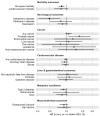Phenome-Wide Analysis of Coffee Intake on Health over 20 Years of Follow-Up Among Adults in Hong Kong Osteoporosis Study
- PMID: 39458530
- PMCID: PMC11509949
- DOI: 10.3390/nu16203536
Phenome-Wide Analysis of Coffee Intake on Health over 20 Years of Follow-Up Among Adults in Hong Kong Osteoporosis Study
Abstract
Background/objectives: There has been limited evidence on the long-term impacts of coffee intake on health. We aimed to investigate the association between coffee intake and the incidence of diseases and mortality risk over 20 years among community-dwelling Chinese adults.
Methods: Participants were from the Hong Kong Osteoporosis Study who attended baseline assessments during 1995-2010. Coffee intake was self-reported through a food frequency questionnaire and was previously validated. Disease diagnoses, which were mapped into 1795 distinct phecodes, and mortality data were obtained from linkage with territory-wide electronic health records. Cox models were used to estimate the association between coffee intake and the incidence of each disease outcome and mortality among individuals without a history of the respective medical condition at baseline. All models were adjusted for age, sex, body mass index, smoking, alcohol drinking, and education.
Results: Among the 7420 included participants (mean age 53.2 years, 72.2% women), 54.0% were non-coffee drinkers, and only 2.7% consumed more than one cup of coffee per day. Over a median follow-up of 20.0 years, any coffee intake was associated with a reduced risk of dementia, atrial fibrillation, painful respirations, infections, atopic dermatitis, and dizziness at a false discovery rate (FDR) of <0.05. Furthermore, any coffee intake was associated with an 18% reduced risk of all-cause mortality (95% confidence interval = 0.73-0.93).
Conclusion: In a population with relatively low coffee consumption, any coffee intake is linked to a lower risk of several neurological, circulatory, and respiratory diseases and symptoms, as well as mortality.
Keywords: PheWAS; coffee; health outcomes; mortality; prospective cohort study.
Conflict of interest statement
The authors declare no conflicts of interest.
Figures


References
MeSH terms
Substances
LinkOut - more resources
Full Text Sources
Medical

